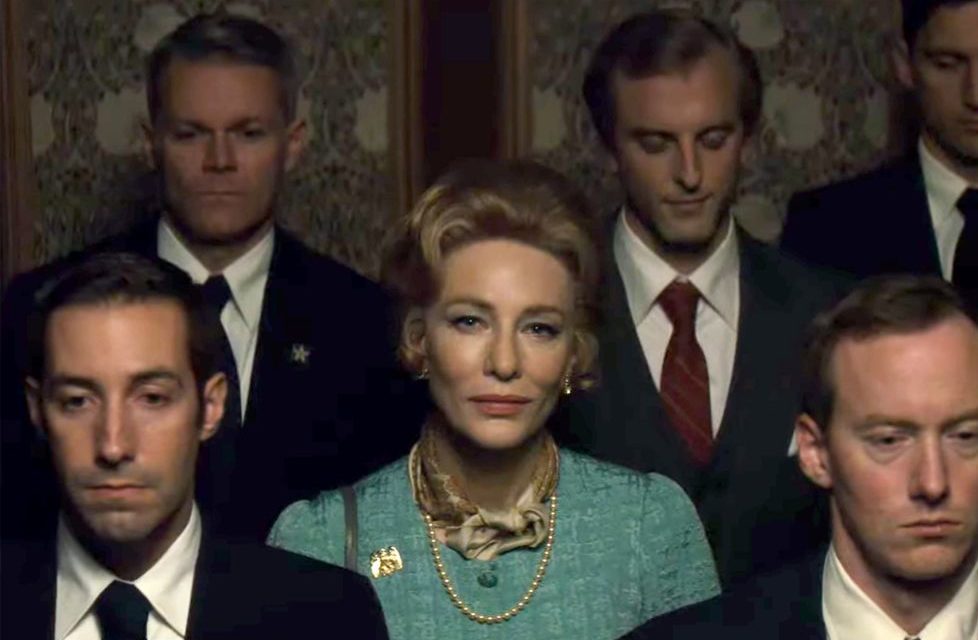If Mrs. America were made in, say, the 1980s, its structure would be the same: A dutiful housewife, smothered by her husband and societal norms, becomes politically active and changes the course of the culture. It would probably star Jane Fonda.
Except Jane probably won’t have given the character the dignity of a portrayal. Because the woman at the focus of Mrs. America isn’t a feminist rebelling against those norms, but one fighting to defend them. Her name was Phyllis Schlafly, one of the most wretched women ever in politics: Someone who lied on national TV to create fear that the Equal Rights Amendment was a slippery slope of homosexuality, free love and the disintegration of the family. Back then, we might have called her a sex-traitor; today, we could just call her Kellyanne Conway.
Schlafly wasn’t the first opportunist, nor even the first to use media and disinformation to bully by fear and generate hatred for The Other, but she was one of the most effective in the modern era, precisely because she twisted facts and compromised principles for a negative end. She would be the villain of most post-modern TV series aiming to explain a cultural black-eye that continues to bruise society (women still make less than men, over all, for doing similar work). But part of what makes Mrs. America compelling is that Phyllis — played by Cate Blanchett — is kinda-sorta the hero. Well, not exactly — more like the unsympathetic protagonist. Historians do it all the time; TV usually likes its good guys more clearly identifiable. (In fact, when it doesn’t, we tend to throw Emmys at them — The Sopranos, Breaking Bad, Ozark. But even they seemed good-hearted by comparison to Schlafly.)
Her offense was one that, sadly, lingers in the consciousness of many men and even a sizable number of women: The idea that the sexes are different, and women should stay home, take care of kids, require their husbands to approve their purchases and be available for sex on his schedule, not hers. It is a brainwash of subservience as duty.
We see that clearly during the first three episodes of Mrs. America, which dropped on Hulu today (new episodes arrive every Wednesday through late May). When Phyllis informs her husband Fred (John Slattery) that she wants to run for Congress, he dismisses it because he won’t move from their Illinois home for her career, and a woman can’t leave her family for a job in D.C. She grits her teeth but withdraws from the race. When he’s horny and she’s not, she gives herself over to him in the most detached, zoned-out sex scene since Klute. She hates these rules. But she cleaves to them like a life-preserver.
Which leads us to ask: Why?
So far, these episodes have not answered the question, though they have suggested that the craven quest for power in any degree is at the root. When Phyllis is appalled by a racist member of her coalition, she enlists a friend (Sarah Paulson) to ask the bigot to tone down her rhetoric; when that doesn’t work, Phyllis elevates the racist in the hierarchy — better unity with assholes than not putting on a pretty facade.
But the series also deals extensively with the other side of the ERA coin: the efforts by Gloria Steinem (Rose Byrne), Bella Abzug (Margo Martindale), Betty Friedan (Tracey Ullman) and Shirley Chisolm (Uzo Aduba) to shake up the male-driven political structure and get abortion rights and ERA in the Constitution, and a woman in the White House.
Fifty years later, they still failed. Maybe that’s why Schlafly is the center of attention — to the victor belong the leading roles.
It’s not as if Mrs. America is a right-wing screed for the brilliance of conservative feminism. You can tell just from the casting on which side its political bread is buttered, as well as the ironic use of commonplace statements so out of date (women serving in combat!?! Horrors!) that the humor comes from their deadpan lack of shame. But in the same way Bombshell took the disgustingly anti-feminist icons of FoxNews and said, “Well, yeah, I guess we gotta give credit where it’s due,” this miniseries shows not only the errors of the left but the desperation of the right to control the discussion on basic human values. People like Schlafly — and Mitch McConnell and Antonin Scalia and their ilk — had an impact, for good or bad. (Bad. Mostly bad.)
The series is deliciously compelling, even if you are incensed by it all. Blanchett remains one of our acting treasures, and while you don’t exactly sympathize with her character, she’s fun to watch doing it.
— Arnold Wayne Jones

